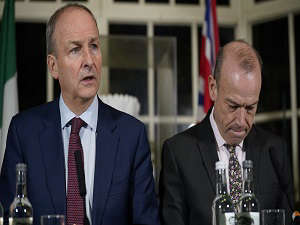
Business activity in Northern Ireland recorded a modest rate of growth last month, according to new figures.
Although the pace was sluggish and weaker than most other UK regions, there was a substantial increase in export orders, the Ulster Bank's Purchasing Managers' Index (PMI) found.
Private sector firms also increased staffing levels for the 21st consecutive month, albeit the rate of job creation was below the UK average for the first time in 10 months.
Richard Ramsey, a chief economist at Ulster Bank, said: "Perhaps the most significant aspect of the latest survey concerned new orders, and the contrasting performance of the domestic and export markets. Overall, incoming orders stagnated in October and have failed to grow since June. However, export orders expanded at their second highest rate since the survey began. This implies that domestic orders have been contracting at a significant rate.
"The converse however seems to be the case within the construction sector. Given Belfast's crane-cluttered skyline, it would appear that business conditions within the local construction market are relatively buoyant. However, despite this, and perhaps surprisingly, the PMI points to rapid rates of contraction in construction output orders and employment. This is largely due to subdued demand within a major external market, i.e. GB."
The overall increase in business activity was led by the retail sector but expansions were also reported in manufacturing and services.
By contrast, construction posted a sharp and accelerated decline in output and was the only sector to reduce staffing levels.
Total new business, meanwhile, was broadly unchanged for the second month running amid uncertainty following the EU referendum result.
The weak trend was recorded despite a near-record increase in new export orders, which surged on the back of the weakness of sterling against the euro.
Mr Ramsey added: "In terms of the EU referendum vote, it has proved to be a mixed blessing for firms. On the one hand, sterling's weakness against the euro has boosted export price competitiveness. Meanwhile, some survey respondents attribute increased uncertainty following the vote as negatively affecting orders.
"A weak pound may be positive for exporters but it is bad news for importers. Input cost inflation accelerated last month to its highest rate since May 2011. Manufacturers and retailers are bearing the brunt of the input cost inflation, with the former posting the fastest rise in input costs since July 2008.
"Overall, it is encouraging that the private sector remains in growth mode. What is concerning though is that the rate of employment and output growth remains relatively weak. Furthermore, the largest contributor to growth remains the retail sector. Given that inflation pressures are intensifying, these will increasingly come to the fore in 2017 with rising consumer prices. This will impact on consumer spending and ultimately act as a major brake on growth."


 Teenage girl killed in road crash named as Kamile Vaicikonyte
Teenage girl killed in road crash named as Kamile Vaicikonyte
 Covid-19 inquiry ‘an opportunity for candour’ from Stormont leaders
Covid-19 inquiry ‘an opportunity for candour’ from Stormont leaders
 UK and Irish ministers to meet amid row over migration
UK and Irish ministers to meet amid row over migration
 Three men set to go on trial for murder of journalist Lyra McKee
Three men set to go on trial for murder of journalist Lyra McKee
 Swann refuses to rule out resigning if budget is not changed
Swann refuses to rule out resigning if budget is not changed